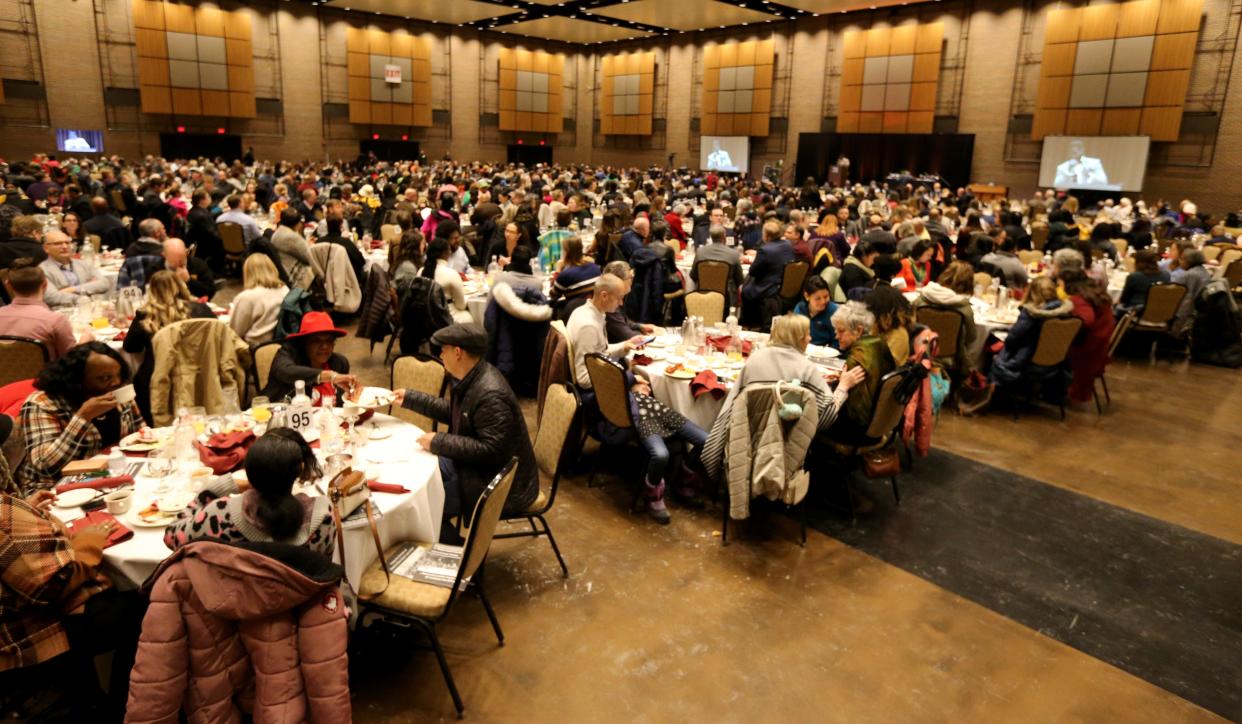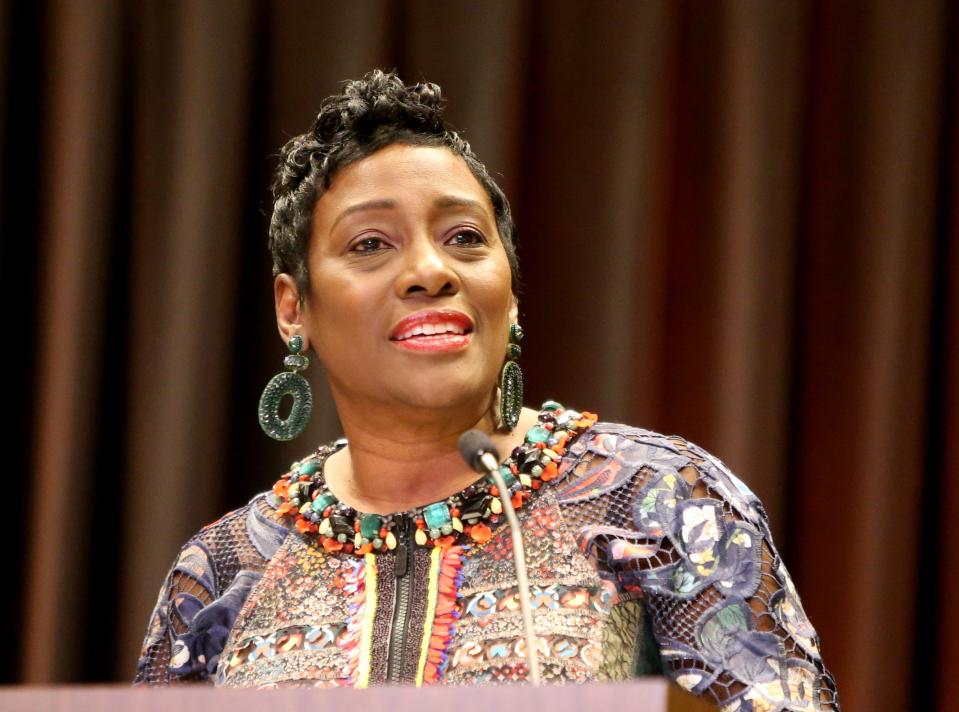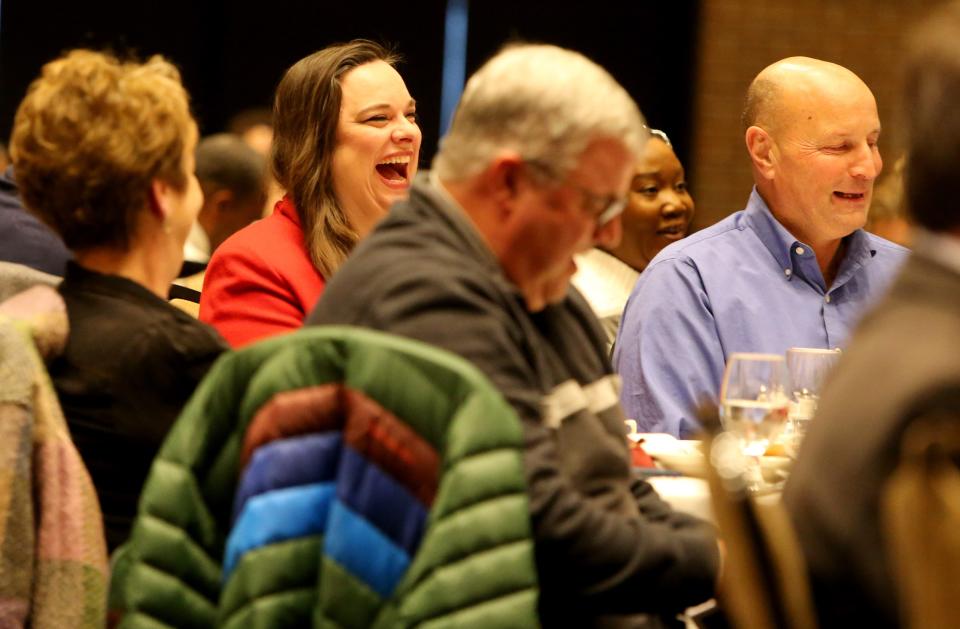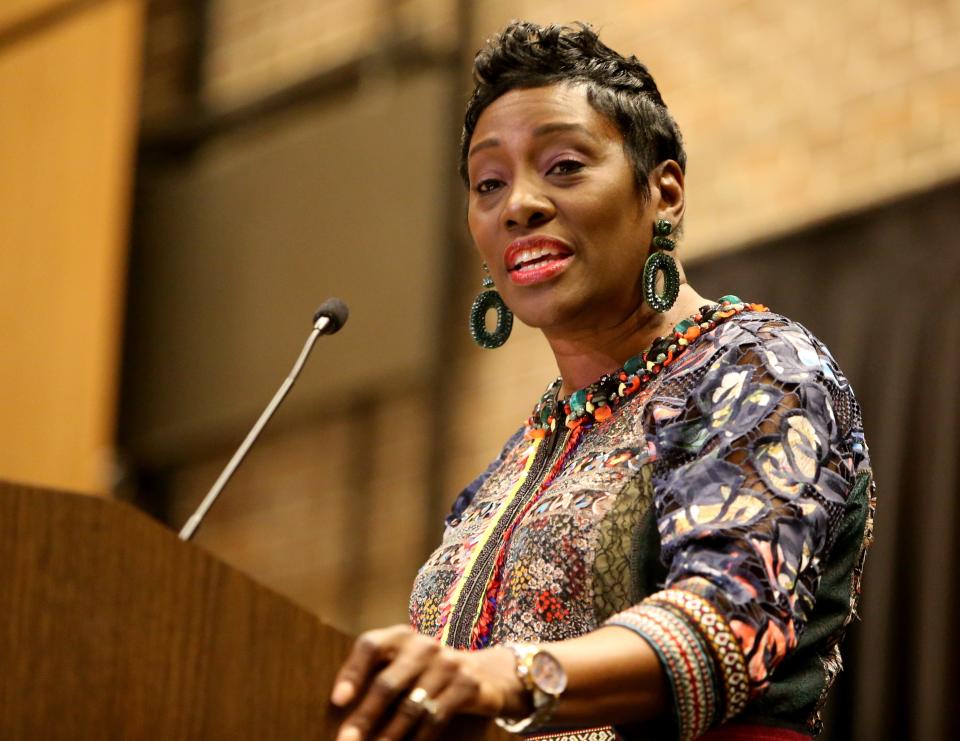'Don't let it die': South Bend's 38th MLK Day celebration asks how to carry dream for peace

- Oops!Something went wrong.Please try again later.
SOUTH BEND — In her keynote speech during South Bend's 38th annual celebration of the Rev. Martin Luther King Jr. on Monday, Kimberly Esmond Adams reflected on her days as a Notre Dame law student, when she pushed for a course on a topic that has inflamed political discourse 27 years later.
Now in her fourth term as a judge on the Superior Court of Fulton County in the busy Atlanta Judicial District, Adams and a group of her African American classmates in 1997 petitioned the dean of the law school to create an elective course on critical race theory.
That spring, according to Adams, Dean David T. Link agreed to include the course in the law school's curriculum. The class focused on what the theory is, Adams said, rather than the catch-all term for perceived liberal overreach that it's become today. Scholars developed the theory following the Civil Rights Movement in response to the notion that the U.S. was finally a color-blind society, Adams said.

"Little did we know at that time that this pedagogy would become so controversial," Adams said Monday to a room of more than 800 attendees.
"In fact," she added, "I worry today that if a request were made by eager students like us, trying to determine how to use their legal education to be brokers of peace in today’s world, which seems fixated on advancing false narratives, that they might be hung in effigy from the outstretched arms of Touchdown Jesus."
It was a strong statement in response to a strong theme meant to guide this year's ceremony: "Keep the Dream of Peace Alive: Don't Let It Die."
More than 800 people attended the Monday ceremony despite the sub-zero morning temperatures that infiltrated the banquet hall at Century Center in downtown South Bend. Community leaders who spoke Monday seemed acutely aware that, by the time of next year's celebration, a presidential election will have put the nation for which King had a dream through a tumultuous reckoning.
"When we talk about woke, we better wake up, America," the Rev. Hardie Blake, the pastor of the Ardmore Church of Christ, said during what started as a welcoming speech and quickly became a fraught exhortation.
The ceremony honored two people who are seen as having worked for decades to bridge divisions in the community and, via the students they've encountered, across the nation.
More: When Notre Dame president Rev. John Jenkins steps down, legacy of research will remain
The Rev. John Jenkins, who is in his last semester of a 19-year tenure as president of the University of Notre Dame, was awarded the keys to the cities of South Bend and Mishawaka by their respective mayors, Democrat James Mueller and Republican Dave Wood.
In his 2005 inaugural address, Jenkins said that Notre Dame would be "a center for learning whose intellectual and religious traditions converge to make it a healing, unifying, enlightening force for a world deeply in need."
"I believe in this community, and I believe in its future," Jenkins said Monday. "If we can work together, this great community can be even greater."
Elizabeth Bennion, a political science professor at Indiana University South Bend for nearly 25 years, was given a community service award created in honor of Roland Kelly, a South Bend Common Council member and former news anchor who died in 2007.
Bennion teaches American politics and is the director of IUSB's American Democracy Project, which hosts forums and debates among local candidates for municipal office. She also hosts WNIT's weekly television program "Politically Speaking" and is an active member of the Indiana Debate Commission.
"The students in my classes give me hope that we can discuss controversial issues while treating each other with respect," Bennion said Monday.

Adams said her point in mentioning critical race theory was that keeping the dream of peace alive entails an honest accounting of the nation's past, including the racism that she says remains embedded in our most powerful institutions. Notre Dame in 2021 launched an interdisciplinary "Initiative on Race and Resilience," whose mission is to challenge systemic racism and support communities of color on campus and beyond.
"Politicians — not university professors or academics, but politicians — decided to conflate the concept of critical race theory with teaching grade-level students about the history of the nation," Adams said, "to avoid dealing with the truth of this nation’s history."
"For me," she later added, "the real question is: What are you trying to hide? And what are we afraid of?"
She quieted the crowd with a litany of statistics that may signal an answer.
At 17%, the Black poverty rate is nearly twice that of white Americans. Black Americans comprise 13% of the U.S. but more than a third of its incarcerated population. African Americans are 10 times more likely to be killed by gun violence and three times more likely to be fatally shot by law enforcement. Black women in the U.S. are three times more likely to die during childbirth or from pregnancy-related complications than white women here.
To face down what seems intractable, Adams told attendees to turn to one another and say this: "We are the ones we have been waiting for."
“Too often we are waiting for someone to come and save us," she said. "We are waiting for some silver-tongued, slick-talking prophet, some well-worn politician or some cosmic genie to show up on the scene to mobilize us and tell us what to do and how to do it.
"Well, newsflash," she finished. "The someone for whom you have been waiting is the person you see in the mirror every morning and the collective us.”

Email South Bend Tribune city reporter Jordan Smith at JTsmith@gannett.com. Follow him on Twitter: @jordantsmith09
This article originally appeared on South Bend Tribune: Notre Dame law grad speaks during South Bend's MLK Day celebration

